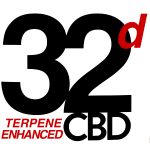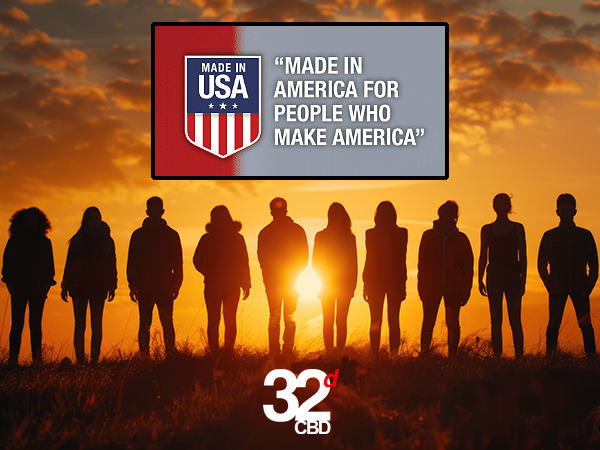
CBD Basics and Benefits
Today, thanks to the 2018 Farm Bill legalizing industrial hemp nationwide, as well as evolving perceptions and increasing knowledge, people all over the country get a variety of benefits from THC-free CBD.
Here's what you need to know...

Our products are made with CBD from industrial hemp,
not marijuana.

CBD (Cannabidiol) is...
People use the words “cannabis” and “marijuana” interchangeably, but they aren't exactly the same.
- Cannabis refers to all products extracted from the Cannabis sativa plant that contains around 540 chemicals.
- Marijuana refers to certain parts of the same Cannabis sativa plant that contain significant amounts of tetrahydrocannabinol (THC). THC is responsible for the effects of marijuana on a person’s mental state. Certain types of cannabis plants contain very little THC. Under U.S. law, these plants are considered “industrial hemp” rather than marijuana.
In the 1960s & 1970s, THC was the focus of researchers and the cannabis community. Then starting in the 1980s, CBD generated increasing interest. It's now known that CBD and THC have similar benefits but CBD doesn't make anyone feel "high."

Here's the science...
CBD interacts with your body’s Endocannabinoid system.
The Endocannabinoid System consists of cannabinoid receptors found throughout the body. The Endocanniaboid System communicates with the central nervous system, immune system and organs.
There are a pair of cannabinoid receptors - CB1 and CB2 - and they are located on the body's cells. Cannabinoids stimulate these cannabinoid receptors. This triggers actions in the receiving neuron, causing a series of cellular responses required for overall health.
The CB1 receptors are located in the central nervous system, including the brain's nerve cells and along the spinal cord. These receptors are active in motor systems, memory, discomfort, and disposition, along with sleep.
The CB2 receptors work primarily with your immune system. When triggered, these receptors are signals to the body to help with inflammation, discomfort and tissue damage.

QUESTIONS & ANSWERS
Is marijuana the same thing as cannabis?
People often use the words “cannabis” and “marijuana” interchangeably, but they don’t mean precisely the same thing.
- The word “cannabis” refers to all products derived from the plant Cannabis sativa.
- The cannabis plant contains about 540 chemical substances.
- The term “marijuana” refers to parts of or products from the plant Cannabis sativa that contain substantial amounts of tetrahydrocannabinol (THC). THC is the substance that’s primarily responsible for the effects of marijuana on a person’s mental state. Some cannabis plants contain very little THC. Under U.S. law, these plants are considered “industrial hemp” rather than marijuana.
What are cannabinoids?
Cannabinoids are a group of substances found in the cannabis plant.
What are the main cannabinoids?
The main cannabinoids are THC and cannabidiol (CBD).
How many cannabinoids are there?
Besides THC and CBD, more than 100 other cannabinoids exist.
Has the U.S. Food and Drug Administration (FDA) approved cannabis or cannabinoids for medical use?
The FDA has not approved the cannabis plant for any medical use. However, the FDA has approved several drugs that contain individual cannabinoids.
- Epidiolex, which contains a purified form of CBD derived from cannabis, was approved for treating seizures associated with Lennox-Gastaut syndrome or Dravet syndrome, two rare and severe forms of epilepsy.
- Marinol and Syndros, which contain dronabinol (synthetic THC), and Cesamet, which includes nabilone (a synthetic substance similar to THC), are approved by the FDA. Dronabinol and nabilone treat nausea and vomiting caused by cancer chemotherapy. Dronabinol also treats loss of appetite and weight loss in people with HIV/AIDS.
Is it legal for dietary supplements or foods to contain THC or CBD?
The FDA has determined that THC or CBD products cannot be sold legally as dietary supplements. Also, U.S. companies cannot add THC or CBD to foods for sale.
Are cannabis or cannabinoids helpful in treating health conditions?
Drugs containing cannabinoids may help treat certain rare forms of epilepsy, nausea and vomiting associated with cancer chemotherapy, and loss of appetite and weight loss associated with HIV/AIDS. In addition, some evidence suggests modest benefits of cannabis or cannabinoids for chronic pain and multiple sclerosis symptoms. Cannabis isn’t helpful for glaucoma. Research on cannabis or cannabinoids for other conditions is in its early stages.


